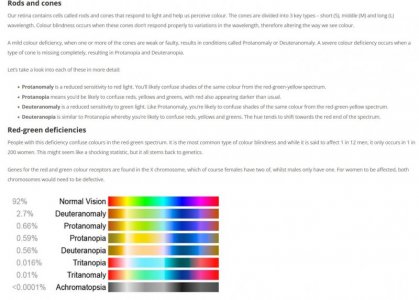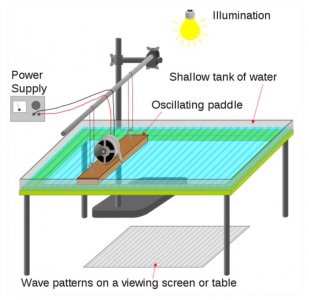Thanks
@bobcat for your excellent discussion inputs.
We are more in agreement than we are able to easily communicate with limited, tersely created ideas and language terminology. That is why I changed different to "somewhat different" so the meaning was not absolute. In science sense discussions, one will often read those claiming we all see colors differently and then use the men's X-chromosome argument where 8% of men have varying levels of abnormal color vision while women are 0.5%. But when one looks at data, research shows that 92% of humans have reasonably normal testable similar color vision.
Of those 8% of men with abnormalities, their issues vary to degrees because although some may not have normal amounts of the 3 retina rod and cone types, such is usually not total as tends to be argued. Instead, someone may have 90% of normal numbers of red cones causing mild protanomaly while another person may be 75% and another 25%. Beyond red-green issues, anomalies become significantly rarer.
View attachment 448027
Understanding colour blindness | Lenstore.co.uk
The same applies to other sense issues to different degrees because each of our human senses as physically large organic beings with billions of cells, are the result of specialized tissues with large numbers of sense cells and sense neural system circuits for which our genetic design varies somewhat in amounts created even without basic changed genetic issues. I would expect the sense of taste varies most, since what humans eat varies regionally greatly, so genetic variations likely readily occur.
As for where the research is heading, I only vaguely understand the science and processes being used and can only speculate from opinions of experts how much understanding may eventually be possible. I can state that if future measurements of specific area brain electromagnetic (EMC) fields for two individuals are nearly identical, that it is more logical to expect their conscious experience is likely to be reasonably similar. Others may argue even if so, their conscious experience may still be radically different since the brain is extremely complex with interactions between elements. I would not lean towards that opinion.
Below is a diagram of a common physics class experiment with water waves. Waves propagate from the board against opposite container walls. Depending on the amount of board movement and its frequency and distance from reflecting ends, waves change. My input here and hypothesis is that, our brain neural tissues are like the end container walls. What I speculate is, qualia is primarily the result of the fine detailed 3-dimensional shape of those container walls. Thus evolution over long time scales, creates structures that result in variations in the shape of resulting EMC standing waves against those structures.
View attachment 448028
Watch the below YouTube video from the 13:00 point through 23:00 that shows what such standing waves look like. My hypothesis is that perceived qualia results from the resulting 3-dimensional resulting phenomenon against such structures. When one takes psychedelics, field power amplitudes have been shown to increase that results in greater perceived detail as one might then expect. It may be, that some wave phenomenon for different senses in different parts of the brain may have identical EMC structures but that perceptual experiences are greatly different because of varying ways the rest of those areas of the brain processes such information.
In any case, as you noted, there will always be uncertainties of what is really going on in the brains of individuals. We simply cannot and will never know. But science is rapidly moving closer to understanding far more than was the case even a couple decades ago.



